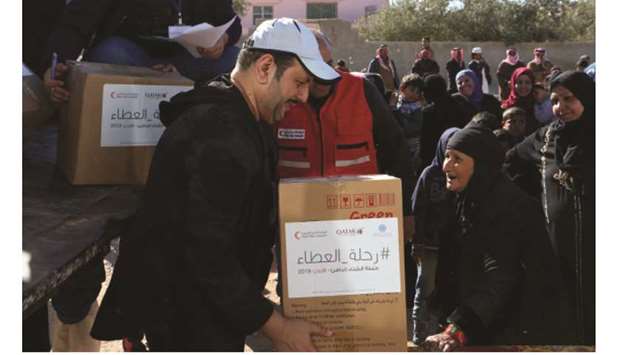It has 19 representative offices and missions abroad, in more than 30 countries around the world, through the implementation of projects, programmes and humanitarian interventions amounting to about QR600mn, for the benefit of some 26,734 people in need, the displaced and the refugees.
QRCS stressed that the health sector is one of its top priorities. And it has allocated a total budget of more than QR245mn, through which it can guarantee the expenses of treating many sick cases, providing primary, secondary and emergency health care services, monitoring vaccination campaigns for children, and supporting and providing hospitals and health centres with medicines, equipment and ambulances, operating health clinics in camps for the displaced and refugees, covering the costs of dialysis for the needy, and sending multidisciplinary medical convoys.
QRCS also made use of its material and development efforts to support projects to accommodate the displaced, refugees and displaced persons in many countries at a cost of more than QR108mn, and QRCS spent a budget that exceeded QR61mn on food and livelihood projects, as well as implementing projects related to the water sector in 16 countries with a budget of QR61mn.
The report also dealt with the humanitarian assistance provided by QRCS in the field of education to countries in need, as it is one of the most important pillars of development.
The report said that in three years, QRCS implemented educational projects in nine countries with a value that exceeded QR16mn.
QRCS equipped hospitals and built the capacity of local medical cadres, and during the past three years, their number reached 20 medical convoys, which helped treat 9,852 patients, at a total cost of more than QR6.925mn.
QRCS pointed out that it did not neglect its duty to support the state and the world in facing the crisis of coronavirus (Covid-19), as an embodiment of its unique legal capacity as a supporter of the state in its humanitarian and social policies.
QRCS explained that since the World Health Organisation (WHO) announced the pandemic, QRCS prepared all its cadres, and established training courses and field camps, and co-ordinated with the state institutions concerned with responding to accidents and risks.
QRCS added that it was keen to involve the community in the efforts to combat the pandemic, by launching a fundraising campaign to provide means of prevention and personal protection for health cadres and volunteers in the country and supporting health systems in a number of countries in need and preventing the spread of the virus.

